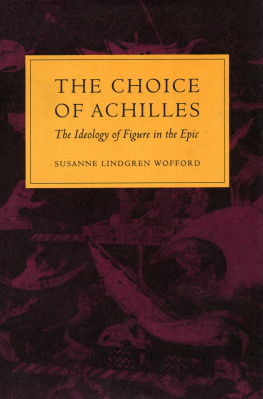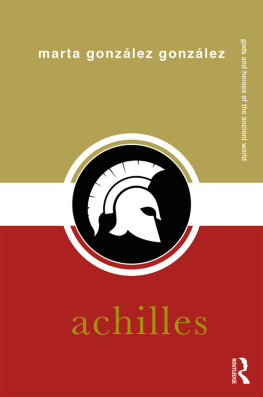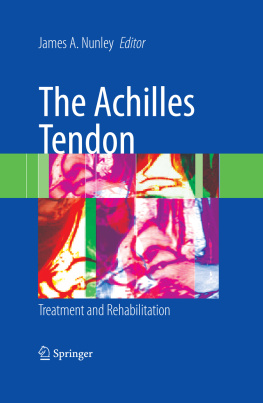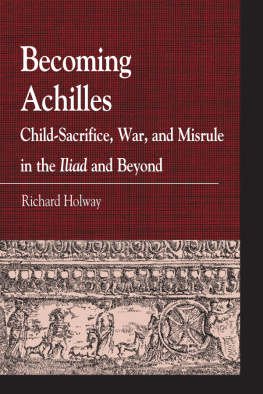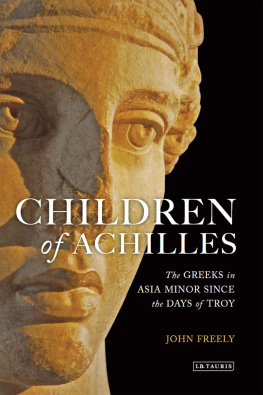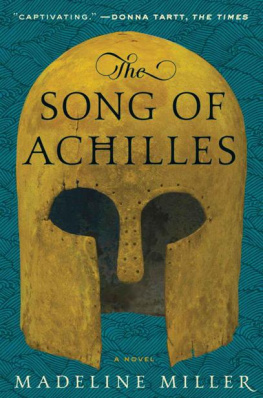Homère - The choice of Achilles : the ideology of figure in the epic
Here you can read online Homère - The choice of Achilles : the ideology of figure in the epic full text of the book (entire story) in english for free. Download pdf and epub, get meaning, cover and reviews about this ebook. City: England, year: 1992, publisher: Stanford University Press, genre: Home and family. Description of the work, (preface) as well as reviews are available. Best literature library LitArk.com created for fans of good reading and offers a wide selection of genres:
Romance novel
Science fiction
Adventure
Detective
Science
History
Home and family
Prose
Art
Politics
Computer
Non-fiction
Religion
Business
Children
Humor
Choose a favorite category and find really read worthwhile books. Enjoy immersion in the world of imagination, feel the emotions of the characters or learn something new for yourself, make an fascinating discovery.
- Book:The choice of Achilles : the ideology of figure in the epic
- Author:
- Publisher:Stanford University Press
- Genre:
- Year:1992
- City:England
- Rating:5 / 5
- Favourites:Add to favourites
- Your mark:
- 100
- 1
- 2
- 3
- 4
- 5
The choice of Achilles : the ideology of figure in the epic: summary, description and annotation
We offer to read an annotation, description, summary or preface (depends on what the author of the book "The choice of Achilles : the ideology of figure in the epic" wrote himself). If you haven't found the necessary information about the book — write in the comments, we will try to find it.
Homère: author's other books
Who wrote The choice of Achilles : the ideology of figure in the epic? Find out the surname, the name of the author of the book and a list of all author's works by series.
The choice of Achilles : the ideology of figure in the epic — read online for free the complete book (whole text) full work
Below is the text of the book, divided by pages. System saving the place of the last page read, allows you to conveniently read the book "The choice of Achilles : the ideology of figure in the epic" online for free, without having to search again every time where you left off. Put a bookmark, and you can go to the page where you finished reading at any time.
Font size:
Interval:
Bookmark:
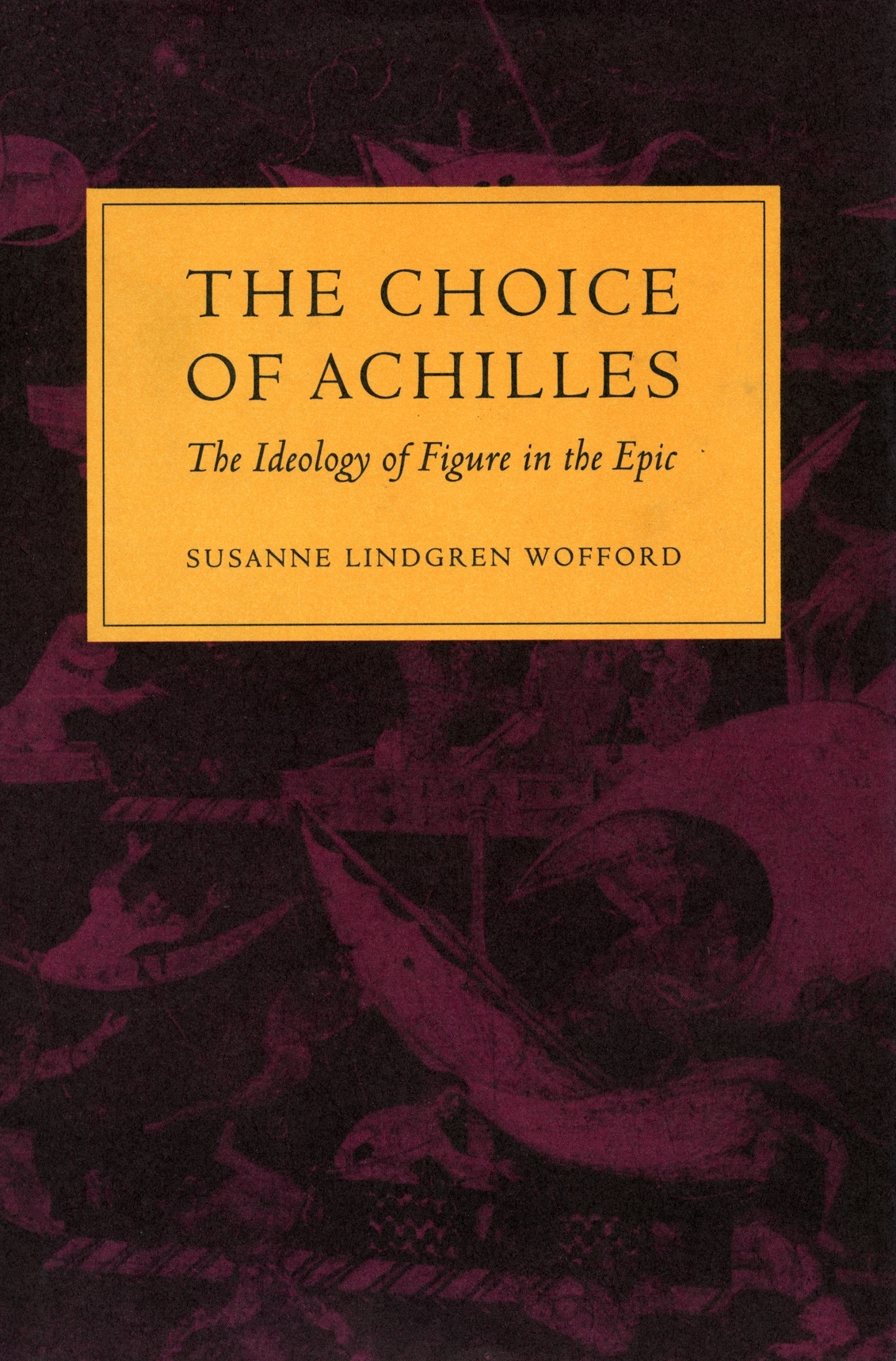
This book has been so long in the writing that it has often seemed to me to achieve its own version of the unending iterative cyclicality that I describe as characteristic of epic figuration. Thanks are due, then, first to Thomas M. Greene, Margaret K. Ferguson, Gordon Williams, and Lowry Nelson, Jr., who read and commented on the dissertation from which my book eventually emerged. Thomas Greene has read several later parts of the book with his usual thoughtful care, and has given me valued advice and support throughout my many rewritings. Id like also to thank John Hollander for his crucial interventions at several stages of revision, and for the encouragement he gave me at the moments in which my epic task seemed insurmountable. I owe a special debt to Harry Berger, Jr., and to the anonymous Classics readers for Stanford University Press whose judicious suggestions about revisions gave the book a new life. They pointed me to several scholarly works that helped me over significant difficulties in my conceptualization. I also thank Helen Tartar, my editor at Stanford Press, for her faith in the book when it most counted; Ellen F. Smith, the project editor, for her help and patience; and Nancy Atkinson, for her insightful copyediting.
My students at Yaleespecially Bianca Calabresi, Rachel Eisler, and Sarah Bankswill recognize their contribution to this work, especially in the Spenser chapters. My research assistants each deserve special thanks. Sarah Mace worked long and hard with the Iliad chapter, helping me to tighten the argument and trying her best to dissuade me from my reading of the end of the poem. Her intelligent criticism and assistance were invaluable. Nina Revoyr performed a similar service for the rest of the manuscript, struggling at times with my prose style, and questioning me insistently about the place of women (and the politics of misogyny) in my argument. Bill Johnson-Gonzalez very kindly helped me verify the accuracy of the Cervantes bibliography and notes. Ambreen Hai worked long and patiently to produce the index.
My friends in the study group on ideology, resistance, and cultural formHelen Siu, James C. Scott, William Kelly, Deborah Davis-Friedmann, Jean-Christophe Agnew, and Keith Luriahave all helped sharpen my understanding of how everyday, often hidden or unacknowledged acts of resistance to cultural domination can make possible a cultural or political criticism of surprising range and power. Though they may not recognize their contributions here, our concerns with what lived individual experience might tell us and with what the individual might understand and value in larger ideological and political struggles resurfaces in my treatment of the representation of action in the epic as an aspect of these poems that deserves to be listened to in its own right.
I wish also to thank several other friends and colleagues who have contributed to this project: Mark Rose and James Nohrnberg, who first taught me to read Spenser; Ellen Peel, whose postcard with a bibliographical suggestion sent me in several good directions; Michael Cadden, who provided essential assistance on a moments noticeour many debates over the years have always kept me rethinking questions that I believed I had answered; Jonathan Freedman, who affectionately urged me to be more polemical; Alicia Fernndez, whose questioning of whether theories of ideology lead to social change helped me see more clearly the challenge to heroic values that the epic can provide; Eugenia DeLamotte and Shira Wolosky, whose friendship and example have taught me much about what it means to be an intellectual; and Sheila Murnaghan and Mihoko Suzuki, each of whom read drafts of the most recent version of this booktheir careful comments, and the special comradeship they offered, have meant a great deal.
Acknowledging help and friendship has its own rhetorical form and generic constraints, and it remains for me to reassure my readers that none of these people is responsible for the errors in this book. While in this genre the name may serve as a trope to invoke the full authority of the person cited, I must demystify that trope in the moment of employing itto some extent at least. Many of my readers and assistants tried hard to argue me out of what they viewed as interpretive errors that have nonetheless somehow found their way back into the text. For the return of these suppressed or challenged readings, and for any other errors, I must take full responsibility.
Finally, my parents and family have lived with this project for many years with warmth and encouragement and only occasional moments of bafflement. I owe them thanks for their support, emotional and otherwiseincluding the providing of several lovely, cool places away from New Haven in which to write. Finally, and most importantly, I thank my husband, Jacques Lezra, who read each of the versions of the book, debated the theoretical questions they raised, and encouraged me to believe that the project was worth doing. It is simply true to say that without him this book would not exist.
I take the prose commentary quoted below from Jean Richers 1584 Paris (Latinogallica) edition of Alciatis Emblemata, p. 83 verso, instead of from the 1551 edition from which I take , for the prose gloss does not appear in the 1551 version. As this illustrates, the commentary is not present in all versions of the emblem.
On transformative or critical imitation in Renaissance poetry, see the already classic account of Greene in Light in Troy. For the moral allegorical readings of the classical epics, see D. C. Allen, Mysteriously Meant; Murrin, Allegorical Epic; and Lamberton, Homer the Theologian.
On the difference between the first and second parts of Miltons Paradise Lost, and on the changing relation of the narrator to his story, see Berger, Paradise Lost Evolving, pp. 330 and 334. In my description, I have drawn on his characterization of the first six books: There is, then, something of the satanic as well as of the archaic in the expanding, soaring, outward-bound vision of the first six books (p. 334). For the two parts of the Aeneid, see Otis, Virgil, on the difference between the Odyssean Aeneid and the Iliadic Aeneid. See also Nohrnbergs account of the epic duplex (his term) in Analogy ofThe Faerie Queene, pp. 5867.
The phrase is McKeons, Origins of the English Novel, p. 281. See McKeons argument that we switch from a progressive utopianism of upward mobility in Part I to a conservative utopianism of the revival of harmonious feudal social relations (p. 287) in Part II. On this change in ideology, and on the importance of Avellanedas Quixote in tracing the ideological challenges of Part I in particularand indeed on how the existence of this other Quixote necessitates a more profound meditation in Cervantess Part Il on literariness and secondnesssee Mariscal, The Other Quixote. In my view, McKeons account of the change in political value from Part I to Part II cannot be extended, as he himself to some extent acknowledges, to the novels more radical formal ambiguities.
Citations from The Faerie Queene are taken from A. C. Hamiltons edition. My debts to Spenser scholarship are more extensive than I am able to indicate in text and note references. Among the works whose influence will, I trust, be apparent in these pages are Colies Resources of Kind, Fletchers Allegory and Prophetic Moment, Giamattis Earthly Paradise and Play of Double Senses, and the several essays by Montrose on the cultural poetics of Elizabethan England, including especially his analysis of the politics of pastoral in Of Gentlemen and Shepherds, and Eliza, Queene of Shepheardes. On Spensers relation to Virgil, see M. OConnell, Mirror and Veil, pp. 45, where OConnell describes Spensers imitation of Virgils double position of praise and criticism: Virgils own lacrimae rerum embrace the destruction of Carthage and the submergence of Italic cultures and traditions. By no means do all the points of contact between Aeneas and Augustus flatter the emperor. It is this dual purpose of celebration and moral judgment of a nation and an age that defines the most profound connection between Spenser and the Latin poet he emulated (p. 4). OConnell continues: The Faerie Queene, though undeniably patriotic, seems by its reticence toward specific historical deeds more skepticalmore Virgilianthan nationalistic. The two motives of celebration and moral judgment describe accurately... the shape of Spensers meditation on his age. For the most part he prefers to separate them, almost as dialectical opposites, and often chooses different poetic modes for the expression of each (p. 5). I differ from OConnell in seeing the division between celebration and criticism as displaced and suppressed, acknowledged sometimes through the poetic debate between modes or genres, but most often emerging rather in the central disjunction of the poem between figure and action. Goldberg, in Endless Worke, demonstrates the connection between the compulsions of desire and of allegory in Book IV, and considers also, as I do, how allegorical compulsion becomes a figure for social compulsion. I have benefited, for instance, from his reading of the Amoret /Lust episode: We watch characters becoming the figures of their desires (p. 88). He also emphasizes the ways in which the text indicates the controlling power of figure. Berger, in Allegorical Temper, employs a distinction between story and allegory that is somewhat similar to mine, and comments on the texts inability to maintain both elements of the analogy between story and allegory (p. 33), suggesting a mode of reading that emphasizes allegorys establishment of two different perspectives that confront each other on the poetic subject matter (p. 128). Bergers reading of Spenser in this book and in his later essays has continually informed my own.
Font size:
Interval:
Bookmark:
Similar books «The choice of Achilles : the ideology of figure in the epic»
Look at similar books to The choice of Achilles : the ideology of figure in the epic. We have selected literature similar in name and meaning in the hope of providing readers with more options to find new, interesting, not yet read works.
Discussion, reviews of the book The choice of Achilles : the ideology of figure in the epic and just readers' own opinions. Leave your comments, write what you think about the work, its meaning or the main characters. Specify what exactly you liked and what you didn't like, and why you think so.

